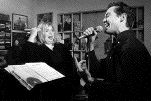“
Get over to the mic. You’re not leaving”
From the Sharon Dunn |
| ‘Get over to the mic. You’re not leaving’ From beginner to professional singer in 10 hours? I had to try |
 [Photo: Kevin Van Paassen, National Post] Singing is “as intimate as sex, that’s why people are so vulnerable.” Diana Yampolsky demonstrates vocal technique to student Jason Meloche. “Maybe it’s not too late to be discovered,” singing teacher Diana Yampolsky tells me optimistically when we meet. I’m here because Yampolsky, whose clients include Raine Maida of Our Lady Peace and Brian Byrne of I Mother Earth, advertises that she can unleash anyone’s hidden singing talent in 10 easy hours. “People are motivated by a dream,” says Yampolsky, a music major originally from Leningrad and founder of Royans Vocal Productions. “I see totally normal business professionals who, if I advise them, are ready to leave their careers making $100,000 a year because they want to be a professional singer. “In the meantime,” she says, in her thick Russian accent, “they’re in their forties and they can’t carry a tune in a bucket.” “I’m in my forties,” I point out. She rolls her eyes. “I had one professional man, 43. He presented to be normal, he sold his business for the sheer fact that he wanted to be a professional singer, but he couldn’t sing to save his life. I told him it would take at least 100 lessons, and even then I couldn’t guarantee a Sony contract.” Although that client never came back, Yampolsky says she always tells the truth about a student’s talent. “There are those who have a chance and those who don’t, those who can make it to be a Celine Dion or a Whitney Houston, and those who have to go a level below, who have a chance to sing for weddings and funerals, or voiceovers and karaoke. Everyone’s voice can be improved,” she says. Yampolsky says her “accelerated artist development” is an innovative and unique approach to voice mechanics. “It’s a structural approach, a special methodology.” One of her specialties is voice repair. Even record companies — Sony, Warner Bros., BMG and Universal, among them — refer clients to her. “It is a holistic approach,” she says. “Your voice is an expression of who you are, a reflection of the state of your being. One thing I can tell without even hearing you sing,” Yampolsky tells me, “is that you are a very strong woman … with balls.” I thank her for the, er, compliment. “My claim to fame,” she says, “is beginner to professional singer in 10 hours — guaranteed.” I ask her to repeat herself. “Is my accent that bad that you can’t tell what I’m saying?” she snaps. I tell her that it is and await the consequences. She rolls her eyes again. Yampolsky decides I will sing My Heart Will Go On, Celine Dion’s hit from the movie Titanic for my voice test. “Take your boots off,” she tells me, “so that I can have a look at your instrument.” “What instrument?” I want to know. “Your body, you’re the instrument,” she says as I stand on my tiptoes and she looks me over. She tells me that I’m not proportionate. “Like a Stradivarius that’s warped”, she complains. “You’re top heavy When the ‘instrument’ is out of whack, the idea is to compensate”, says Yampolsky. Then she presses the record button to videotape my performance, and I’m off. I don’t sound too bad, I think, and I look forward to watching the tape. But the sad truth comes out when she plays it back to me. As a matter of fact, it will go down as one of the defining moments of my life because now I can no longer fool myself into thinking I can sing. Here I am on tape looking and sounding like what can best be described as a horribly injured cow, caught in an extended moo. I blush furiously, and for one of the few times in recent history, I’m speechless.”Your voice is all over the place,” Yampolsky says, not unkindly. “Your problem is this,” she tells me. “You’re like an airplane trying to take off — with the airport attached. Your voice is supposed to leave your physical body. You’re committing vocal rape [strong and forceful], instead of vocal love-making [strong and gentle]. If you were a gymnast, you’d be falling off the balance beam every minute.” She insists I try again after some tips, but I lie and tell her I have to leave. Yampolsky tells me singing is “as intimate as sex, and that’s why people are so vulnerable. “Get over to the mic,” she orders. “You’re not leaving. And don’t stand like a pregnant woman,” she barks. “If it was easy, I wouldn’t have clients flying over from Japan and Hong Kong.” “You’re tough,” I tell her. “That’s why I get results,” she shoots back. “You didn’t bite,” she yells as I try again to sing. “Bite, bite, bite. Suck in your air, open up your upper diaphragm, smile, and place the sound on top. Your face has good structure for singing,” she points out, adding, “You know, the big mouth. “Give me middle C.” I do as I’m told. “Perfect,” she tells me. (Apparently not everyone can hit middle C.) “I had a man come in who looked like a Russian mobster,” she says. “He really wanted to sing, but he appeared to be tone-deaf, and couldn’t hit middle C. He told me that if I taught him to sing, he would give me a gift. A bullet or a Mercedes-Benz, I’m not sure,” she quips. “He wanted to sing Queen’s ‘Bohemian Rhapsody’, One of the lines is “Mama just killed a man.” Although it’s been three months, her client hasn’t returned. “He told me he had to be away on business,” she confides. We record again. I’m biting, and my hands are forming an arc over my head, as she has instructed. Once again, we sit to watch the tape. The transformation from the first tape is unbelievable. “It’s a person that can sing,” says Yampolsky. And she’s right, but it doesn’t sound like me, it’s more a young-Willie-Nelson-meets-Shirley-Temple type of sound. “I sound so young,” I tell her. “It’s your spirit coming out,” she says. “You’re young at heart. You’re 32 years old in your spirit. This is excellent,” she enthuses. “If you didn’t screw up the last part, it would be amazing. You have it, big-time,” Yampolsky announces. “Forget singing for funerals. You could be phenomenal.” She’s finally prepared to let me leave. I’ve been with her for more than two hours, and in the meantime another student has come in. His name is Jason Meloche, and he’s a professional singer. He tells me that Yampolsky’s method has repaired his vocal cords.”Are you afraid of her?” I ask. “A little bit,” he laughs, “but my voice doesn’t get sore anymore.” Yampolsky says Christina Aguilera, Britney Spears and especially LeAnn Rimes and Kelly Clarkson, of American Idol fame could all benefit from her help. “Would you give them lessons for free?” I ask. “No way,” she says. “They must pay four times what everyone else pays.” Whatever that is. She refuses to discuss fees with me. As I’m about to leave, I consider again what she’s told me — that I could be a great success as a singer. “Could I have a song on the radio?” I ask. “I don’t want to jump to conclusions,” she says quickly, dashing my dreams. by Sharon Dunn |








